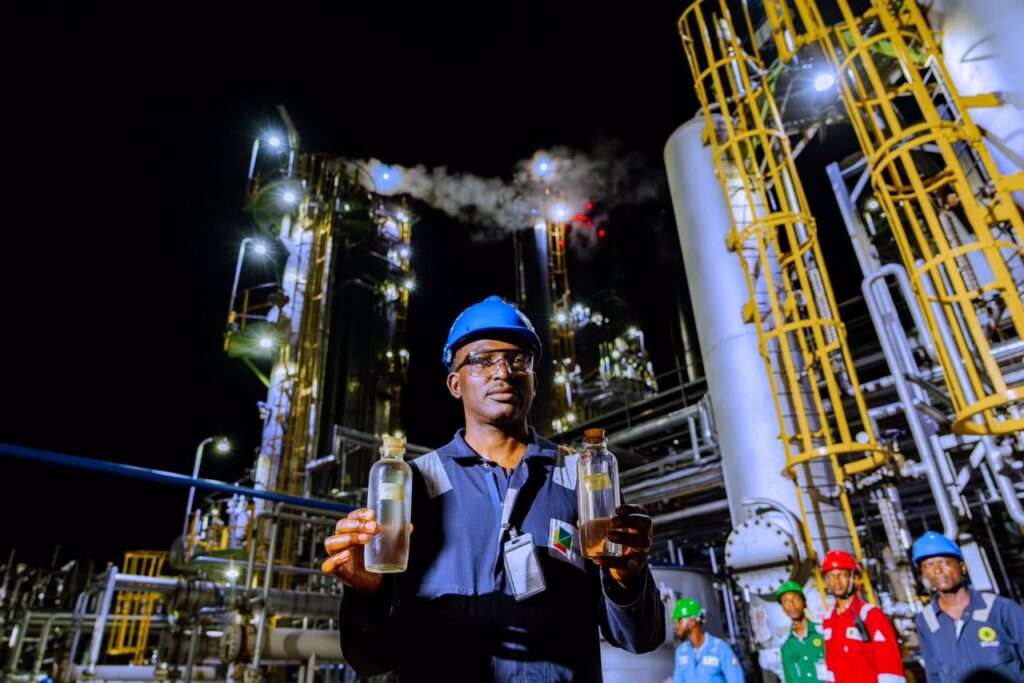The Federal Government of Nigeria has directed the Nigerian National Petroleum Company Limited (NNPCL) to escalate crude oil production to 2.5 million barrels per day (bpd) by the end of 2025.
This directive was announced by the Minister of State for Petroleum Resources (Oil), Heineken Lokpobiri, during an interview at the Africa Energy Forum (AEF) in Houston, Texas.
Minister Lokpobiri emphasized the urgency of this target, highlighting that the previous goal set by President Bola Tinubu was 2 million bpd.
“The Federal Government has mandated the NNPCL to increase oil production beyond current levels by the end of the year.
“Accelerated growth in our nation’s oil output is not just necessary; it’s imperative.”
Heineken Lokpobiri, Minister of State for Petroleum Resources (Oil)
Addressing concerns about the feasibility of this ambitious target, Lokpobiri pointed out that Nigeria had previously achieved similar production levels.
“This target is achievable. We’ve reached these numbers before, even during the challenging times of the COVID-19 pandemic.”
Heineken Lokpobiri, Minister of State for Petroleum Resources (Oil)

He attributed past successes to strategic policies and emphasized the need for renewed commitment to surpass previous benchmarks.
Lokpobiri highlighted the Drill or Drop policy under the Petroleum Industry Act (PIA), explaining that the regulation mandates new drilling to replenish reserves following any oil extraction.
This policy ensures that Nigeria maintains long-term energy security and does not deplete resources without sustainable replacement measures.
Lokpobiri also underscored Nigeria’s improved regulatory environment and competitive fiscal terms, positioning the country as a prime destination for energy investments.
“Global investors should recognize the opportunities in Nigeria’s oil sector. Our policies are now more transparent, and the investment climate is conducive.”
Heineken Lokpobiri, Minister of State for Petroleum Resources (Oil)
Nigeria’s Strategic Investment Opportunities

At the Africa Energy Forum, industry leaders stressed the importance of strategic investments across both traditional and renewable energy sectors.
Mrs. Jumoke Oyedun, Managing Director of ACME Multech Services Nigeria, noted that the 2025 Africa Energy Forum serves as a key platform for assessing opportunities and challenges within Africa’s oil and gas sector.
“This forum provides an opportunity to evaluate investment strategies in oil, gas, and renewable energy while addressing the complexities of transitioning to sustainable sources.”
Mrs. Jumoke Oyedun, Managing Director of ACME Multech Services Nigeria
She further emphasized Africa’s dual challenge—balancing the global energy transition while ensuring oil, gas, and green mineral resources remain central to economic development.
Oyedun added that anticipated shifts in U.S. energy policy could impact African investments, urging regional leaders to adapt their strategies to remain competitive.
Despite challenges, Nigeria remains one of Africa’s leading oil producers and an important player in global energy markets.
Lokpobiri’s directive reflects efforts to reclaim lost ground and reinforce Nigeria’s role as an attractive energy investment destination.
As Africa navigates shifts in global energy policies, Nigeria is positioning itself to attract international partnerships while ensuring that domestic production meets sustainability goals.
Oyedun stressed that smart investments will determine Africa’s ability to meet global energy demands while benefiting local communities.
“Africa is at a turning point. With strategic investments, the continent can strengthen its energy markets while ensuring local populations benefit from its vast natural resources,”
Mrs. Jumoke Oyedun, Managing Director of ACME Multech Services Nigeria
Nigeria’s bold target of 2.5 million bpd represents an ambitious, yet achievable milestone aimed at revitalizing the nation’s petroleum sector and reinforcing its global energy leadership.
With renewed government commitment, improved fiscal incentives, and expanded private sector engagement, stakeholders remain optimistic that Nigeria can drive meaningful growth in its upstream oil industry.
READ ALSO: Wencai Zhang Calls on Finance Minister, Pledges Stronger World Bank-Ghana Partnership




















